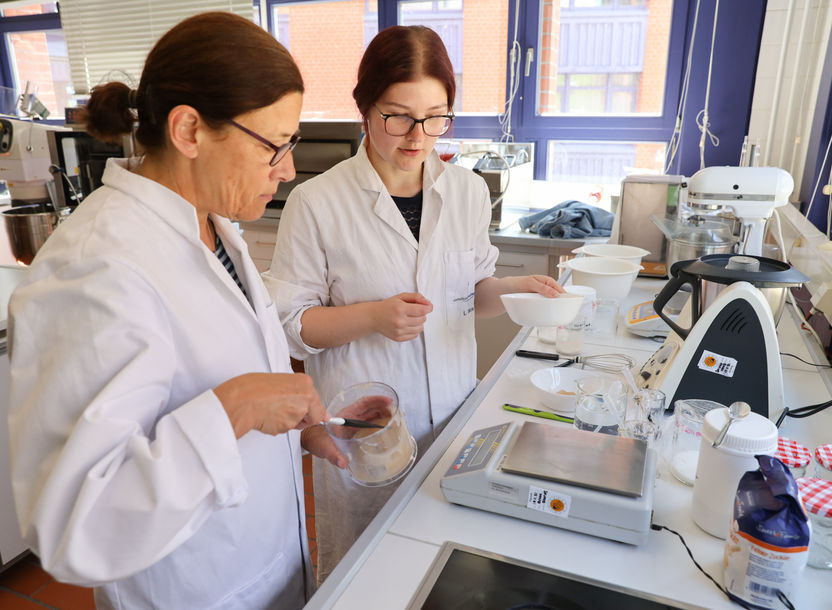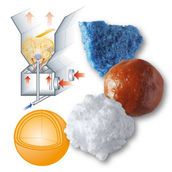Does mango go with kohlrabi?
ReformBio" project explores the potential of food pairing for sugar reduction
Advertisement
Less sweets, more fruit and vegetables: this year, too, the goal of eating healthier from now on is one of the most popular New Year's resolutions. However, large amounts of sugar can be hidden in supposedly healthy foods, such as muesli and fruit yogurt. The project "Reformulation Strategies for Organic Foods" (ReformBio) at Bremerhaven University of Applied Sciences is looking for ways to reduce the sugar content in processed organic foods without sacrificing taste and consistency. One possible tool is so-called food pairing, in which sometimes very different foods complement each other perfectly in terms of taste. At this year's Biofach trade fair in Nuremberg from February 14 to 17, trade fair visitors will be able to see for themselves at the stand of the State of Bremen that sugar-reduced foods are no less delicious. The project will be represented there with products for tasting.

Dipl.-Ing. Kirsten Buchecker and Lisa Nitze (from left) are working on organic foods with reduced sugar content that also appeal to the senses.
Kai Martin Ulrich
Currently, project manager Dipl.-Ing. Kirsten Buchecker and project employee Lisa Nitze are working on a sugar-reduced fruit yogurt and are investigating to what extent they can use the properties of food pairing. This could provide an opportunity for natural sweetness in fruit preparations, for example. "Natural sweeteners, such as grape syrup, can have an unusual flavor of their own. In combination with certain fruits, however, this can enhance the fruity flavor or provide more sweetness," explains Kirsten Buchecker. A database is used in which information about the aromatic compounds in various foods is stored. This makes it possible to find out which foods go well together and can enhance each other's aromas. This can result in combinations that seemingly don't go together - mango and kohlrabi, for example. "We haven't tested that for our yogurts, but strawberry and rosemary, for example. Maybe we can find innovative flavor combinations or recombine popular varieties with less sugar," Buchecker says.
But it's not just the taste of a reduced-sugar fruit yogurt that has to convince consumers, but also its consistency. This is a particular challenge for the researchers. "A sugar reduction of up to 20 percent is possible without major problems. But if we reduce the sugar content by 25 percent, the yogurt becomes runny," says Lisa Nitze, a member of the project team. The reason: In combination with thickening agents, the sugar forms structures that ensure the desired consistency. If the sugar content becomes too low, this no longer works. In the university's laboratory, the project team is working to ensure that the yogurt does not turn into drinking yogurt. This is not so easy for organic foods, he said, because many additives are not allowed. "It is true that there are natural thickeners that we are allowed to use. But these either have a taste of their own or make the fruit no longer taste good. Then you would have to work with flavors, which is not allowed in the organic sector. That's why we're also investigating whether food pairing can help us here," explains Nitze. Currently, the scientists are developing recipes for strawberry, mango and blueberry yogurt. "So far, we haven't found a solution that would allow us to maintain the firm consistency of the yogurt when sugar is reduced by 25 percent or more. We are working on it, but possibly the end result is that it just doesn't work," Nitze said.
The high sugar content in processed foods is a problem. Products for children in particular often contain more than 20 percent sugar. This applies not only to conventional foods, but also to organic products. To counteract this, the "National Reduction and Innovation Strategy for Sugar, Fats and Salt in Finished Products" was adopted in 2018. By 2025, for example, manufacturers want to reduce the sugar content in fruit yogurts by 15 percent and in breakfast cereals by at least 20 percent. In the long term, a sugar reduction of 30 percent is planned. The first product development of the "ReformBIO" project, a crunchy muesli, has already undergone several tastings - with positive results. "We were able to develop a muesli that is just as crunchy as the sugary varieties, but contains 30 percent less sugar. This also improved the Nutriscore from C to A," says Buchecker. Currently, the researchers are not only working on a reduced-sugar fruit yogurt, but also on cookies. Here, too, consistency is a major challenge, as sugar creates the desired crunchiness. By the end of the project, they also want to develop a soft drink with up to 30 percent less sugar.
Studying, teaching and researching with enthusiasm - that's what Bremerhaven University of Applied Sciences stands for. In more than 20 practical and innovative courses of study, the approximately 3,000 students benefit from close cooperation with regional industry and modern teaching and learning approaches. The numerous research activities of the "Hochschule am Meer" have already received numerous awards and support sustainable developments in the region and beyond.
Applications for the summer semester 2023 are still possible until February 15, 2023.
Note: This article has been translated using a computer system without human intervention. LUMITOS offers these automatic translations to present a wider range of current news. Since this article has been translated with automatic translation, it is possible that it contains errors in vocabulary, syntax or grammar. The original article in German can be found here.































































